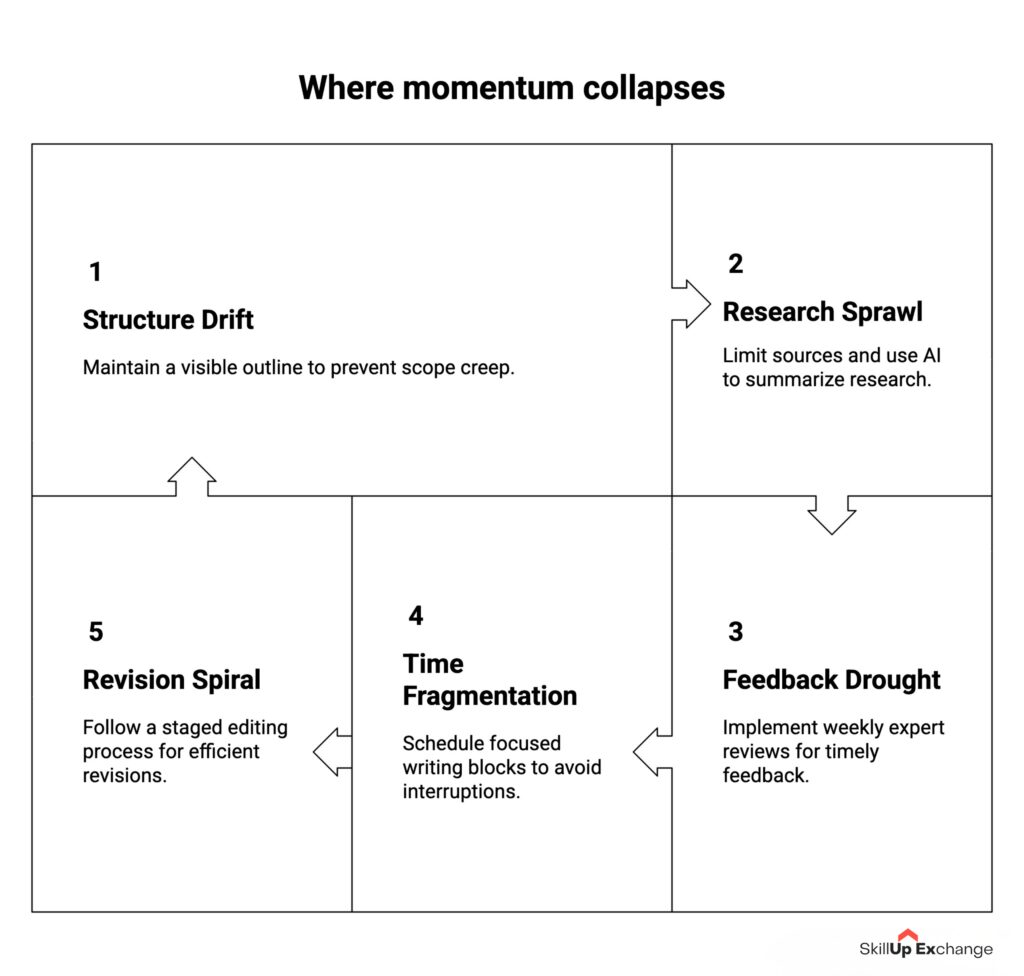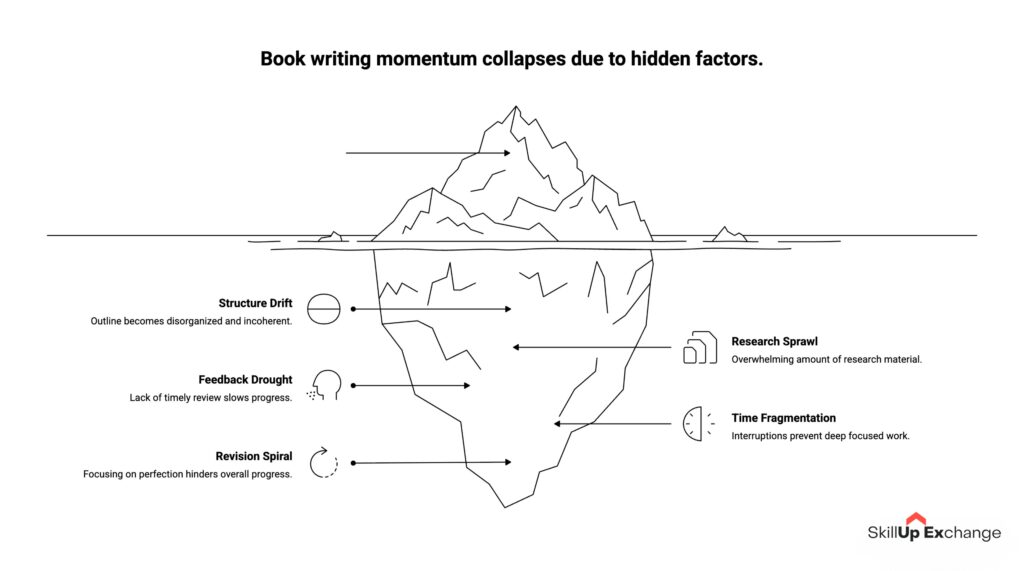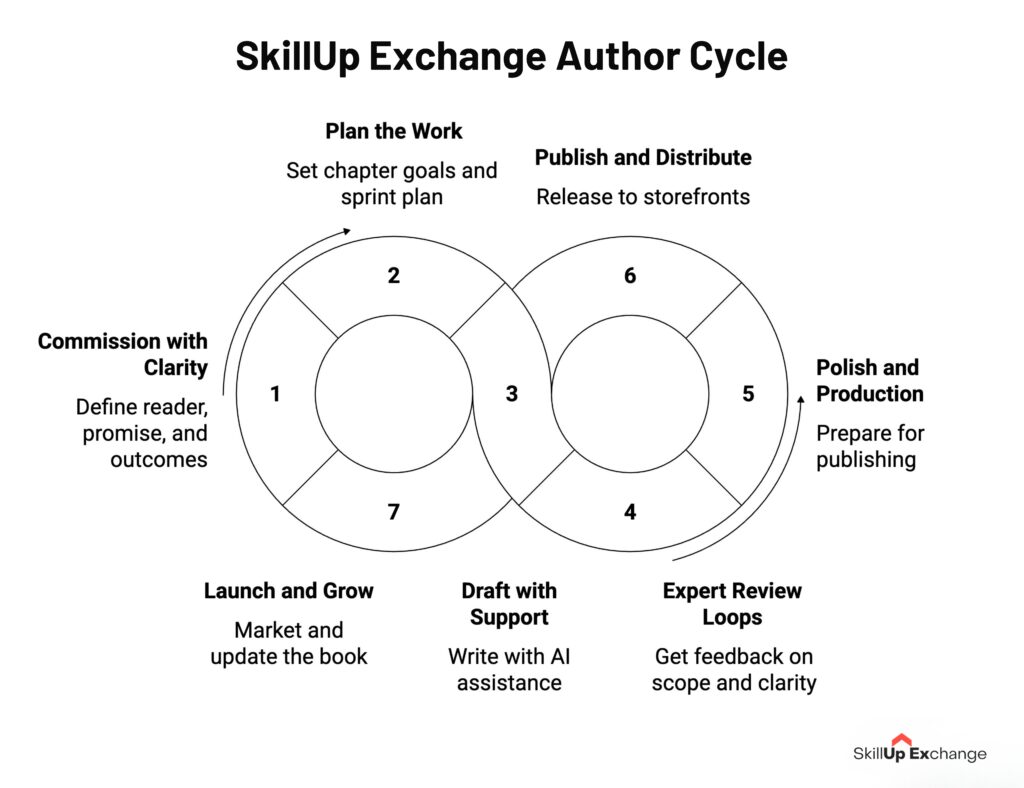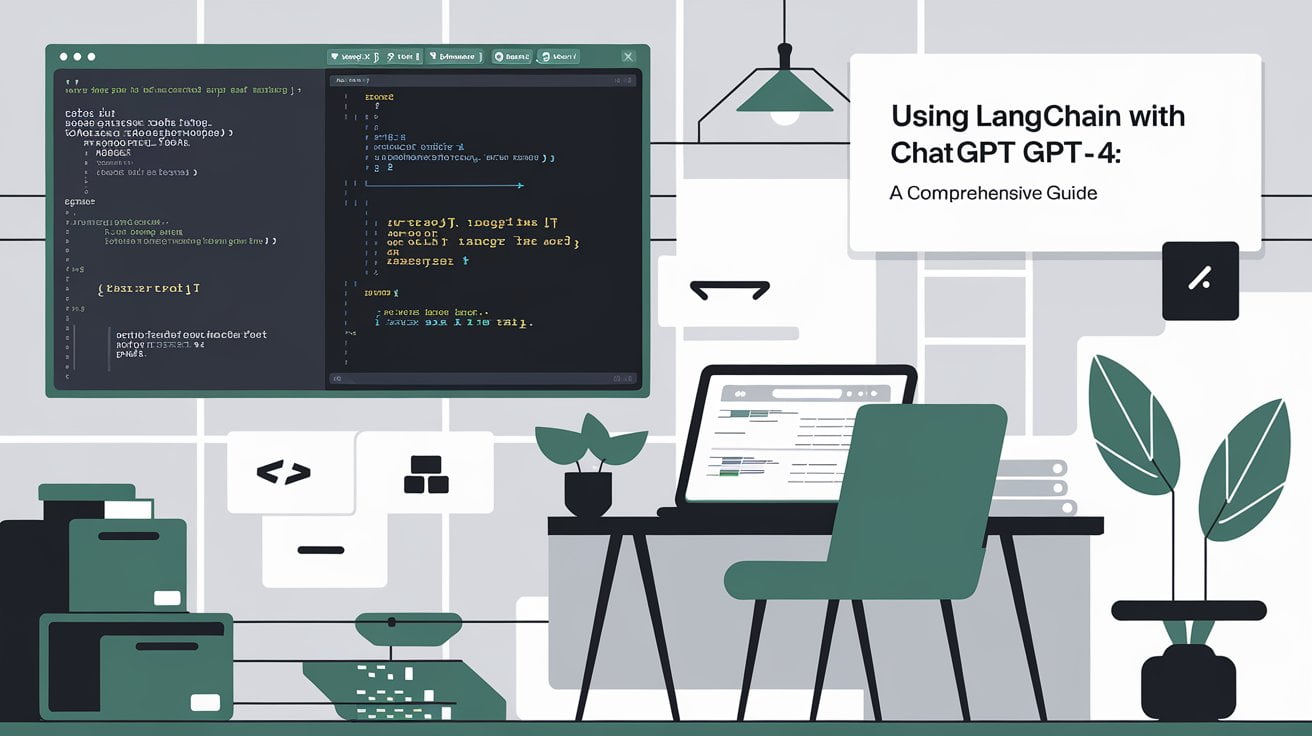The modern author’s dilemma, why writing a book feels harder than ever

Across fields, and most clearly in tech publishing, turning deep knowledge into a book is hard. The blocker is not ideas. The blocker is structure, steady feedback, and the long grind between drafts.
Many authors report six to twelve months for a manuscript, based on Reedsy’s survey data. Community sprints show the appetite for structure, more than 413,000 people joined NaNoWriMo programs in 2022, each aiming for 50,000 words in thirty days.
The bar for attention is rising as well, Bowker counted over 2.6 million self published ISBN titles in 2023, up 7.2 percent year over year.
In a world like this, process and steady feedback are not luxuries, they are the only way through the grind.

Where momentum collapses

Structure drift
You start with a neat outline and end with twelve half chapters that do not fit together. Scope grows, order blurs, and the north star fades. In tech publishing this creates version confusion, mixed levels, and chapters that reference features that changed mid draft.
Research sprawl
Links, papers, issues, and release notes pile up until the chapter becomes a scrapbook. Useful facts sink under more facts. In fast moving stacks, yesterday’s thread or changelog can overturn a claim you wrote this morning, so the pile grows while confidence falls.
Feedback drought
Silence kills speed. Without timely review, small structural errors become full rewrites. In technical topics the cost is higher, because missing assumptions, broken examples, and unclear prerequisites stay hidden until late readers try to follow the steps and fail.
Time fragmentation
Most authors do not abandon the book. They abandon the calendar. Meetings and messages slice the week into pieces too small for deep work. Tech authors lose even more momentum because context switches wipe fragile understanding of code, diagrams, and proofs that need long attention.
Revision spiral
Perfection hunts the first chapter while the rest of the manuscript does not exist. You polish paragraphs while the underlying tool or API shifts under your feet. The result is a beautiful first section that no longer matches current practice, and a missing middle that never catches up.
By the numbers
Many authors spend six to twelve months on the writing itself before production even begins. Reedsy
Meanwhile, open source moves fast. Across ecosystems, the average project shipped ~16 versions in a single year. Major ML frameworks also post multiple releases per year.
The surface area keeps expanding. The npm registry hosts more than two million packages, with activity that regularly spikes to tens of thousands of new publishes in a single day. Put simply, the book clock is slow and the tech clock is fast. The gap is why chapters that feel current in January can be dated by spring.
What authors actually need
Authors do not need louder motivation. Authors need a clear system that protects the voice, reduces friction, and keeps momentum visible. Here is that system inside SkillUp Exchange.

Commission with clarity
Start with a strong proposal. Our commissioning space helps you define the reader, the promise, and the outcomes. AI agents scan public signals to surface demand, recurring questions, and gaps in existing books. You leave with a focused brief, a scope you can defend, and a table of contents that makes sense.
Plan the work
Turn the brief into a living outline. Set chapter goals, success criteria, and a simple sprint plan. The outline stays visible while you write, so scope stays honest and decisions are easy to track.
Draft with support
Write the chapter while agents handle the repetitive work. Get structure suggestions, style checks, and citations formatted for you. Ask for tables, diagrams, and figure captions that match the chapter question. You keep the voice. The system keeps the rhythm.
Expert review loops
Bring in experts at the right moments. A commissioning review to confirm scope and audience fit. A chapter review that checks clarity, accuracy, and level. A final draft review that looks at flow and claims before you export. Margin notes route back into the outline so feedback becomes a decision, not a distraction.
Polish and production
Move from useful to clean. Agents help with references, glossary, captions, and alt text. Export to print ready PDF and to digital formats like EPUB. Request a cover concept and a style sheet that keeps typography and layout consistent.
Publish and distribute
Prepare smart metadata, categories, and keywords. Generate a product page summary, an author bio, and a sample chapter. Publish to major storefronts and to your own site. Keep a simple log of updates so readers know what changed and when.
Launch and grow
Create short marketing copy for social and email. Share a clear promise, who it is for, and proof that the book moves the reader forward. Track interest and questions, then fold the most common ones into a living companion page or a short update. Quality stays high, freshness stays real.
This is the mix that lets an author finish. Clear commissioning, a living outline, steady reviews, and lightweight help from agents and experts. You write the book. SkillUpExchange removes the grind.
Writing a book is not a talent problem. It is a systems problem. Ideas are abundant. Structure, timely feedback, and steady rhythm are rare. That is why smart manuscripts stall even when the author knows the field.
The path forward is calm and repeatable. Commission with clarity. Keep a living outline. Work in small sprints. Ask for expert review at the right moments. Let agents handle the repetitive parts so you can focus on thought and voice.
We operate as a platform, not a checklist. The system sets a reliable cadence, keeps the outline visible to everyone, captures decisions as actions, and ships small updates that compound. The result is momentum that does not drift, reviews that land on time, and content that stays current.
If this picture matches your experience, you are not alone. The gap between ambition and process is real. That is the gap we are closing with SkillUpExchange.





